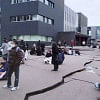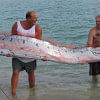Bad weather hits Japan quake survivors

Tens of thousands of people have spent a cold and wet night in temporary shelters following two powerful earthquakes that struck the south-west Japanese island of Kyushu.
More than 240,000 people were urged to evacuate the area amid fears heavy rain could bring landslides and further damage, local media reported.
There is concern for dozens of people feared trapped under rubble.
More than 40 people were killed in Thursday and Saturday's quakes.
About 2,000 people were treated for injuries and nearly 200 are said to be in a serious condition.
Japan's Prime Minister Shinzo Abe erlier admitted many people would be spending an uncomfortable night in evacuation centres, tented accommodation and even in their cars.
But he said his government would work through the night to provide them with food, water and medical supplies.
At least 50 people spent the night in their cars at a public park in the town of Ozu.
They included 62-year-old Yoshiaki Tanaka, his wife and 85-year-old mother. "I don't think we can go back [home]," he told the Associated Press. "Our life is in limbo".
Abe also warned that rescuers were in a "race against time" to find survivors before the bad weather wreaked more damage. Overnight rescue operations "would be extremely difficult", he said.
Saturday's magnitude-7.3 quake struck at 01:25 (15:25 GMT on Friday) close to the city of Kumamoto, which had been hit by a magnitude-6.4 quake on Thursday night.
Both quakes were shallow, causing huge damage to roads, bridges, tunnels, homes and buildings.
Big landslides cut off remote mountain villages. Some 100,000 households were without power and around 400,000 homes without water.
There were many reports of people trapped inside buildings. Chief Cabinet Secretary Yoshihide Suga said rescue workers were aware of "multiple locations where people have been buried alive".
One village had to be evacuated after a dam collapsed as a result of the quake.
Some 20,000 troops were deployed to help police and firefighters in the rescue effort.
As night-time - and the bad weather - approached, they handed out tarpaulins, along with food and water, at distribution points. Local shops quickly ran out of stock, and people spoke of their fear of running out of food, the AP reports.
Aftershocks continue to be felt.

 For all latest news, follow The Daily Star's Google News channel.
For all latest news, follow The Daily Star's Google News channel. 







Comments